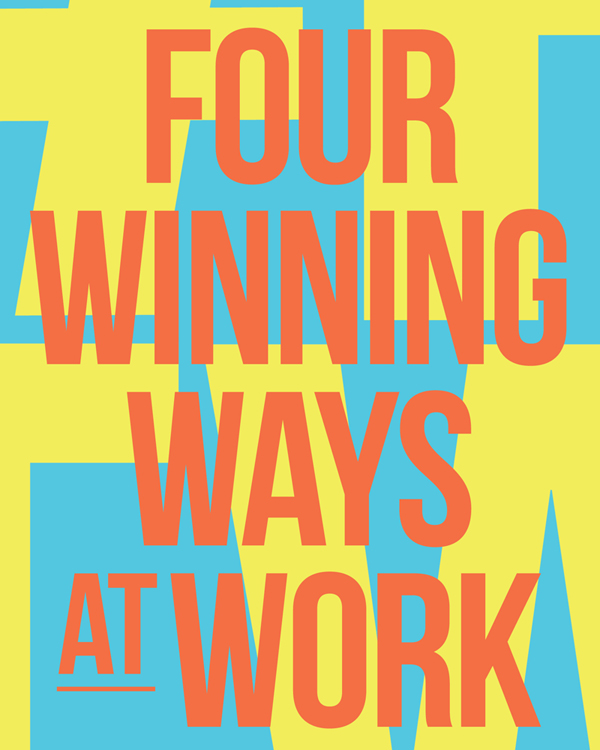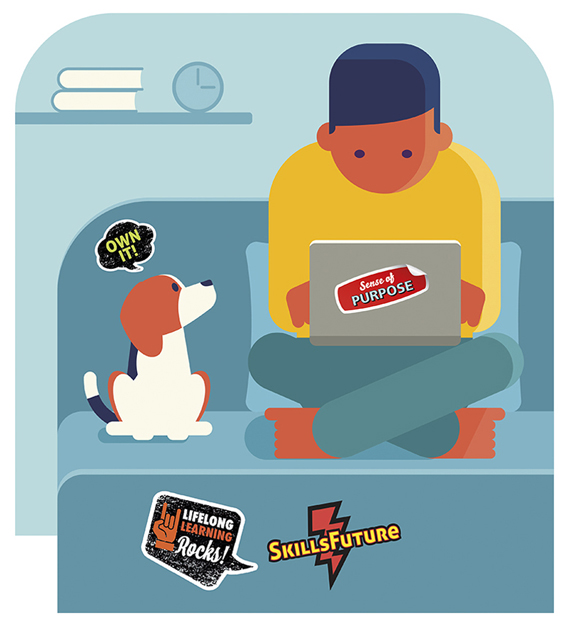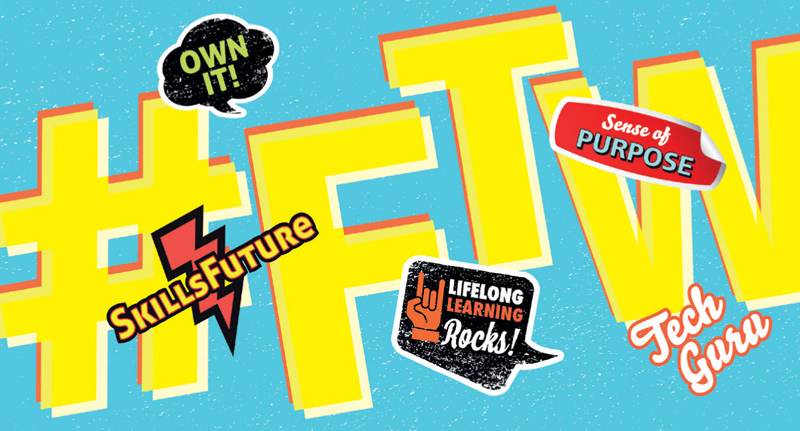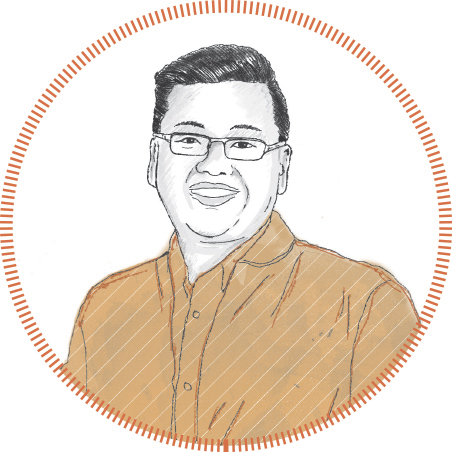Chart A Winning Career: Trends To Know, Changes To Embrace

Ready or not, the way that everyone does their work is about to change. Evolving expectations about how public officers from frontline staff to permanent secretaries should do their jobs and what the Public Service should deliver, on top of how to find enough people to do the work in the first place, are radically upending the very nature of work in public service.
Part of the reason for the change is that there simply aren’t enough people. ManpowerGroup’s 2015 Talent Shortage Survey found, for example, that the number of employers reporting talent shortages climbed more sharply in Singapore than in any of the other 29 countries facing the same problem. With a worldwide competition for scarce talent, public sector managers are figuring out how to do more with less.
At the same time, employers are having to cope with dramatic shifts in the expectations of younger staff. In the 2015 Deloitte Millennial Survey, 60% of millennials said that a “sense of purpose” – as opposed to money or job security – is a key part of why they chose their current job. And Right Management’s 2015 Global Career Aspiration survey found that younger workers rank work-life balance as their top career aspiration. If managers don’t fulfil those expectations, staff may simply leave.
Another reason for the change is technology, as automation takes over functions ranging from passport delivery and translation to writing reports and handling security.
Changes like these and a focus on better service are already leading to changes in public service around the world, and similar shifts could well happen in Singapore. In New Zealand, Deputy Commissioner for State Sector Reform Al Morrison said officers have started thinking “not about what they do in their agencies, but about what is important to [citizens]”, resulting in a public service that is “radically customer-focused”.
What these shifts mean is that public officers will need to work drastically differently in jobs that are changing quickly. They will need to take charge of their career, use technology fully, relish uncertainty and focus on their end goal.
#1 Take Charge of Your Career
While some public officers may have plotted out all their career moves, many are content to be moved about based on the needs of the Public Service. But times have changed. Career ownership is important, as the Civil Service College espouses, and staff now need to assess their career strengths, set priorities and plan their career. Managing your career means figuring out where you want to go and how to get there, rather than assuming a steady upward progression.
Learning is a critical part of the process. “SkillsFuture is here to stay,” said Ms Low Peck Kem, Chief Human Resources Officer, Public Service Division (PSD), of the national movement to encourage lifelong learning and professional development. Taking advantage of the 100 hours of training per year that officers are already eligible for is essential to remaining relevant and having skills that are current. And with the focus being on skills rather than paper qualifications, career development for public officers has broadened significantly. She added: ”From a career perspective, we are quite open to you deciding what you are looking for.”

Ms Tay Li Shing is one who makes deliberate choices about her career. “It’s important that I feel engaged in what I am doing and have a sense of purpose in the role I undertake,” she said. After a career in the legal sector, she joined the Public Service, first in the then-Ministry of Community Development, Youth and Sports, and is now Deputy Director (Community Legal Services Division), Ministry of Law. Her philosophy is to live as one with options: one should not feel “stuck” in a job because one feels that they have “no choice”.
To develop as a manager, she taps the career coaching that is available to public officers – once as part of a leadership course and another during middle manager development while she was at the PSD. “My career coaches have helped me work through thorny issues at work, whether it is leadership style or people or work management,” said Ms Tay.
Managers can assist officers with mapping out their future, said Ms Rosemary Yeo, Director of the Engineering Programme Office. In her case, she draws a career development curve and works with staff to figure out what training and skills they need to move from their current position – for example, at the lower-level left side of the curve – to the top, such as a leadership role, so they can unleash their potential.
Learning to Deal with Diversity
Workplaces around the world will likely become more diverse as new citizens or residents who grew up in other countries fill roles, amidst the increasing shortage of talent. To succeed in this more culturally diverse environment, employees will need to learn how to create an inclusive and harmonious environment, make sure staff feel included and ensure greater employee engagement.
Download the MOM workplace diversity toolkit.
#2 Embrace Technology
While the adoption of personal technology such as smartphones and apps may be slower in the Public Service than some officers prefer, large-scale technology is moving in at an ever-faster pace.
Data analytics, for example, is already driving efficiency throughout the Service. From the National Library Board using data analytics of book loan patterns as well as demographics to determine the number of books to buy, and the Inland Revenue Authority of Singapore using it for the recovery of more than $300 million in taxes, to the Land Transport Authority using it to plan bus routes, agencies are gaining increasing benefits from analytics.

Software companies are also “democratising” data analytics tools so people can use them on their own, Intuit Vice-President Bill Loconzolo told Computerworld, a technology business publication. To keep up, public officers may soon need to learn how to use such tools to solve problems and improve work outcomes by themselves.
And officers are developing new technology to solve problems large and small. As just one example, Ms Yeo said that during the 2003 SARS outbreak, engineers looked creatively at how thermal imagers used in the military could be adapted for rapid, real-time screening of feverish people. The Infrared Fever Screening System was developed within a day, tested and then deployed at Singapore’s checkpoints within a week.
Automation is also changing the nature of work. A Ministry of Health (MOH) team tapped its potential and created an automation system for delivering medications that helped to halve patient waiting times and cut rework (re-sending prescriptions back) by two-thirds. And autonomous vehicles could enable people with disabilities to drive, or even lead to buses or taxis being driven autonomously. With the rise of such disruptive technologies, which can upend entrenched industries (often with low-cost alternatives), officers in policymaking will have to imagine further ahead about trends and their implications on policy implementation.

–Rosemary Yeo, Director of the Engineering Programme Office
Even in highly skilled jobs, automation is leading to redeploying people to new roles, said Ms Tiana Desker, Deputy Head of the Centre for Strategic Futures. Technology may soon assist in professional services such as investments and writing reports. Even in healthcare and education, which need the human touch, robots can help lift patients and online learning can supplement teachers.
Social media is changing work as well. From HR departments using social media for advertising job openings to the Prime Minister using Facebook to share his views, social media is opening up new two-way channels for interactions with the public. All this means that from policymaking to public engagement, officers will have to find new ways to respond to different dynamics.
In using technology to provide better service, Mr Eugene Lim, Deputy Director (Services) in the PS21 Office, PSD, recognises that various needs call for different channels. “Nobody looks forward to transacting with the government over routine transactions,” he said, which is why the aim with routine services, such as the payment of fees, is to “be as friction-free as possible”.
But for major services – buying a house, getting a marriage certificate or receiving social assistance – the human touch still matters. “The digital channel may not be the most appropriate (or not appropriate at all)… Then it is about how we use e-appointments or back-end technology, to make the service experience smoother and easier for customers.”
These changes in technology mean that public officers will need to acquire the skills to use it and innovate. Mr Ravi Menon, Monetary Authority of Singapore Managing Director, at the Institute of Policy Studies’ SG50+ Conference, said: “University degrees may have an expiry date.” That is why officers have to learn on the job as well as take classes and courses to maintain their abilities.
What officers need to do, Ms Yeo added, is to “embrace things you are not comfortable with, have an inquisitive mindset. You have to continually move on. If you don’t, technology will outstrip you.”
Working with Outsourced and Freelancing Colleagues
The Singapore government already outsources more than $1 billion for IT services and cleaning alone, estimates Gartner, a technology research firm. But in public services everywhere, outsourcing could well hit what many consider to be even more critical services. As former head of the US Patent & Trademark Office David Kappos described it, 21stcentury agencies will abandon an “only government experts can do it” mentality and move towards continuous outreach and partnering with think tanks, external consultants and citizens, even in policymaking.
Here in Singapore, Civil Service College Senior Researcher Germin Ong said the Public Service should adopt a more strategic approach to outsourcing and rely on decision-making tools, such as criticality matrices and risk assessment. Public officers will also need to learn to work with colleagues who work independently or may well be in a different location. And managers will need to gain the skills to manage outsourced employees who may be less inclined to simply go with the way public agencies usually operate.
#3 Relish Uncertainty
Public officers will face greater uncertainty as technology, new management models or service delivery needs shift their job scopes or roles, and issues become more complex, cutting across agency boundaries.
As Ms Low described it, the Singapore government has evolved over the past 20 years from decision-making on its own for the people to co-creation of solutions and greater engagement with citizens. “The skill sets are quite different. The environment has changed, the way we train our officers has changed, and the processes have changed.”

There will be the pain of having to adapt. There is no magic formula.
– Jeffrey Ong, Singapore Future Exhibition Project Officer
As just one example, Singapore Future Exhibition Project Officer Jeffrey Ong has had seven jobs at various ministries over three years in his role of bringing his public engagement expertise to different agencies. Moving from his parent agency, the PSD, to other ministries, he has had to contend with diverse working styles – from “rigid and hierarchical” to “empowered at all levels”. He added, matter-of-fact: “There will be the pain of having to adapt. There is no magic formula.”
But far from worrying about the constant change, he is thriving. The moves, he said, “forced me to think about what the agency is concerned with and how I can help”, instead of just porting over his perspective. So even as Mr Ong used similar skills while working on public engagement – for Our Singapore Conversation, MediShield Life at the MOH and a Central Provident Fund review at the Ministry of Manpower (MOM) – each public engagement process was planned and carried out differently based on each agency’s needs.
Moreover, seeing as there are agencies that do better in certain areas, one can always add value by sharing the good practices of others, Mr Ong said, but “only after you have taken time to understand each agency and the constraints it faces”.
The uncertainty of changing environments comes on top of the nature of his work being unpredictable – in public engagement, no one can foresee how the public will react. However, “it is precisely because the challenges keep changing” that makes his work interesting, he added.
Learning to Self-Manage
Public officers may need to adapt to new management practices, such as “holacracy”. Holacracy, which holacracy.org calls an entirely new concept, replaces the traditional hierarchical model with power distributed to every staff, enabling each to work autonomously. Employees in a holacracy work in small teams, discuss and decide their own job scopes based on their strengths and may take on roles across teams.
In Washington State in the US, the local government’s Office of the Chief Information Officer (CIO) has already started piloting holacracy. Besides testing its implementation in government, CIO Michael DeAngelo explained in a blog post that holacracy fits into a “larger strategy” of attracting talent with a “different culture of empowerment”.
In other countries too, public officers are learning to manage amidst uncertainty. In Scotland, for example, the Commission on the Future Delivery of Public Services said it is implementing new inter-agency training as it works on reducing the boundaries and “silo mentalities” that constrain public officers. In the UK, human resources association CIPD’s Director of HR Capability Stephanie Bird said: “Public service transformation is critically dependent on developing new skills, changing engrained behaviours and managing the uncertainty and conflict that can arise as a result.”
To succeed amidst uncertainty, employees will need to enhance their skills for collaboration, autonomy, adaptability and technology through classroom and online learning so that they thrive rather than flounder.
#4 Remember Your End Goal
“Every day I get to wake up and work on things that will directly impact my kids’ lives,” US Chief Data Scientist DJ Patil told Fast Company. “They say the greatest jobs are the ones you laugh in, cry in, work with the world’s best, and just maybe you’ll have a chance to change the world. That’s every day in this job.”

That same desire for making a difference is just as important here in Singapore, and the Public Service actually has some of the most meaningful work anywhere. As Ms Low described it: “We are able to do things at a scale which is only available in public service. We have the ability to build institutions, invest in future technology, groom talent and design public policies with a view 30 years down the road. This is the sense of purpose and meaning of work, not just for the present but also into the future.”
However, it can be easy to forget that larger purpose in the daily grind of work. This also has effects on the recruitment of talent. “Job descriptions are generic. What is lacking is the teams that need people thinking about how work could be made meaningful for the person coming in,” said Mr Ong. When offices can focus more on and share about the meaning of the person’s role beyond just what needs to be done, he said, they will be better able to attract the people they want.
On an individual basis, officers need to keep that sense of purpose in mind and how their work impacts people’s lives. As Ms Yeo put it, officers and their managers need to “make the purpose visible”. (Read more in Challenge November/December 2014: It’s a Tough Job.)
For two winners of the PS21 Star Service Award, both see themselves as ambassadors of the Public Service, not just service providers and employees of a single agency.
Award winner Mr Ricky Chew from the People’s Association wants to show that “actually the Public Service is a group of people who think out of the box, go out of [our] way to see how much we can help you – in the way that you’ll like it to be.”
To keep going, the Constituency Manager gives himself a pep talk every morning, no matter how tired he is, reminding himself of his purpose “to help as many people as [he] can”.
Another service award recipient, Ms Nelly Faizal at the Ministry of Social and Family Development, has her mentor, Quality Service Manager Sumardi Ali, to thank. He is always reminding her of her aim to help people. So when citizens approach Ms Nelly, often thinking the government is rigid and that agencies do not work well together, the Service Excellence Executive is determined to show them otherwise: “You’ve come to me, I’ll do my best to prove to you that we’re not like that.” (Read more about the award winners in Meet the Unbelievables.)
Managers have a key responsibility and, while practices in public service vary, many Gen X managers – between the ages of 35 and 50 – tend to embrace a new mindset. The Wall Street Journal described Gen X managers as being generally more tech-savvy, spending more time wooing and keeping younger staffers, and worrying about how to keep products and services relevant for the rising millennials who will comprise 75% of the workforce by 2025. Part of that wooing will be reemphasising the meaning that officers can gain from their work.

As I’m dressing up for work, even when I’m extremely tired, I look in the mirror and remind myself of my purpose... which is to help as many people as I can.
– Ricky Chew, People’s Association Constituency Manager
And the automation that Ms Desker talked about can also help make work more meaningful. When machines can do the work that officers find tedious and de-energising, “that would free us up to do the type of work that we all find satisfying. Machines are a complement to us,” she said.
The key, of course, is remembering that meaningful end goal every day, even amidst challenging workloads and deadlines. Housing & Development Board Senior Engineer Yak Sin Wen described her work to TODAY as: “My intention was to join an organisation where I could make use of my skill sets in a meaningful way. What better way to do so when your work affects hundreds or even thousands of fellow Singaporeans?”
The future of work in the Public Service will, then, increasingly require officers to take charge of their own destiny. At the same time, the opportunities to take on more fascinating roles, leverage technology to eliminate drudgery and spend time on more meaningful work can lead to a far more satisfying career. The key is being aware of the shifts underway, continually upgrading skills, and embracing the changes that are coming so each officer can create their own future of their work.
- POSTED ON
Sep 16, 2015
- TEXT BY
Richard Hartung
Siti Maziah Masramli
-
Deep Dive
Strengthening Singapore’s Food Security
-
Work Better
Take Ownership Of Your Career Development
-
Deep Dive
In Blockchain We Trust









